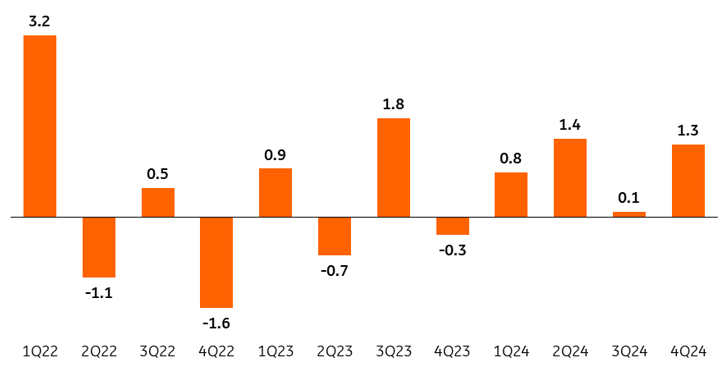Thursday, February 13, 2025 9:00 AM EST

Image source: Pixabay
Poland's first estimates of GDP growth at the end of 2024 confirmed that its economy gained momentum as household consumption improved. In 2025, we see GDP expanding at 3.2% vs 2.9% last year on the back of a rebound in fixed investment, boosted by RRF and EU cohesion funds. We also see real disposable income growth slowing.
The flash estimate of Poland's fourth quarter GDP growth at 3.2% year-on-year wasn't too surprising to us, as annual data released earlier allowed to calculate the fourth quarter as a residual. The reading was, however, at the lower bound of estimates. Nevertheless, it was visibly stronger than the 2.7% YoY growth we saw in the third quarter; the seasonally adjusted data indicates that the economy gained some momentum, expanding by 1.3% quarter-on-quarter vs an increase of 0.1% QoQ in the third quarter of last year.
GDP growth quickened in 4Q24
GDP, QoQ (SA)

Source: GUS.
Poland's StatOffice will publish the detail fourth quarter GDP breakdown on 27 February. According to our calculations, household consumption rose by about 3.2% YoY (vs 0.3% YoY in the third quarter), public consumption jumped up by some 3.4% YoY (vs 4.5% YoY), while fixed investment increased by around 0.6% YoY (vs 0.1% YoY). The picture is complemented by a negative contribution from net exports (-1.1ppt) and positive impact of change in inventories (about 2.0ppt).
In 2025 we expect Poland's economic recovery to continue. Our forecast of 2025 economic growth is at 3.2%, as compared with 2.9% growth reported for 2024. We expect this year to bring a breakthrough in investment activity, supported by projects financed through the Recovery and Resilience Fund (RRF) and faster absorption of the EU cohesion funds. Purchases of military equipment will also support fixed investment. We see household consumption growth this year at 3.0% vs 3.1% in 2024, but we do see some downside risks. Our forecast assumes a gradual decline in the household savings rate, which surged in 2024. The growth of real disposable should slow this year, so if consumers remain frugal, the role of private consumption in driving economic growth may fall short of expectations.
More By This Author:
The Commodities Feed: Oil Edges Lower FX Daily: Prospects Of A Ceasefire Lift European FXRates Spark: A U.S. CPI shocker – Yields Up
Disclaimer: This publication has been prepared by the Economic and Financial Analysis Division of ING Bank N.V. (“ING”) solely for information purposes without regard to any ...
more
Disclaimer: This publication has been prepared by the Economic and Financial Analysis Division of ING Bank N.V. (“ING”) solely for information purposes without regard to any particular user's investment objectives, financial situation, or means. ING forms part of ING Group (being for this purpose ING Group NV and its subsidiary and affiliated companies). The information in the publication is not an investment recommendation and it is not investment, legal or tax advice or an offer or solicitation to purchase or sell any financial instrument. Reasonable care has been taken to ensure that this publication is not untrue or misleading when published, but ING does not represent that it is accurate or complete. ING does not accept any liability for any direct, indirect or consequential loss arising from any use of this publication. Unless otherwise stated, any views, forecasts, or estimates are solely those of the author(s), as of the date of the publication and are subject to change without notice.
The distribution of this publication may be restricted by law or regulation in different jurisdictions and persons into whose possession this publication comes should inform themselves about, and observe, such restrictions.
Copyright and database rights protection exists in this report and it may not be reproduced, distributed or published by any person for any purpose without the prior express consent of ING. All rights are reserved. ING Bank N.V. is authorised by the Dutch Central Bank and supervised by the European Central Bank (ECB), the Dutch Central Bank (DNB) and the Dutch Authority for the Financial Markets (AFM). ING Bank N.V. is incorporated in the Netherlands (Trade Register no. 33031431 Amsterdam). In the United Kingdom this information is approved and/or communicated by ING Bank N.V., London Branch. ING Bank N.V., London Branch is deemed authorised by the Prudential Regulation Authority and is subject to regulation by the Financial Conduct Authority and limited regulation by the Prudential Regulation Authority. The nature and extent of consumer protections may differ from those for firms based in the UK. Details of the Temporary Permissions Regime, which allows EEA-based firms to operate in the UK for a limited period while seeking full authorisation, are available on the Financial Conduct Authority’s website.. ING Bank N.V., London branch is registered in England (Registration number BR000341) at 8-10 Moorgate, London EC2 6DA. For US Investors: Any person wishing to discuss this report or effect transactions in any security discussed herein should contact ING Financial Markets LLC, which is a member of the NYSE, FINRA and SIPC and part of ING, and which has accepted responsibility for the distribution of this report in the United States under applicable requirements.
less
How did you like this article? Let us know so we can better customize your reading experience.





